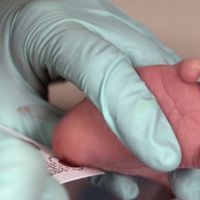Login
SubscribeB cells

Multiple Possible Causes of Long COVID Come into Focus
Natalia Mesa, PhD | Sep 28, 2022 | 10+ min read
Recent studies have lent support for a variety of hypotheses explaining the debilitating symptoms affecting millions of people after SARS-CoV-2 infection.

Slow Vaccine Delivery May Maximize Immune Response
Alejandra Manjarrez, PhD | Sep 23, 2022 | 5 min read
A vaccine strategy involving formulation changes, an initial escalating dose, and a longer wait for booster immunization results in more-effective antibody production against HIV in rhesus monkeys, a study finds.

Immune Cells and ALS: A Balance Between Life and Death
The Scientist’s Creative Services Team | 1 min read
Understanding the role of immune cells in neurodegeneration may help scientists develop new diagnostic, prognostic, and treatment tools.

COVID-19 Vaccines Induce Better Long-Term Immunity than Infection
Jennifer Zieba, PhD | Aug 8, 2022 | 3 min read
For the first time, researchers performed a head-to head longitudinal study comparing the immune response elicited by mRNA and traditional COVID-19 vaccines to primary infections.

Booster Is Best in the Same Limb as Initial Vaccine: Mouse Study
Alejandra Manjarrez, PhD | May 6, 2022 | 4 min read
Compared to mice who got the doses in separate limbs, animals receiving flu shots in the same paw for both a first and second dose had better-trained memory B cells that bound tighter to the vaccine antigen.

Retraining the Immune System Cavalry for Food Allergen Peacekeeping Missions
The Scientist’s Creative Services Team | 1 min read
Explore food allergy immunotherapy for reversing patient symptoms.

Can mRNA Vaccine Momentum Propel Tumor Immunotherapies?
Aparna Nathan, PhD | Nov 12, 2021 | 4 min read
A guide to mRNA-based cancer vaccines and where they’re headed next

Bispecific Antibodies Treat Cancer in Mouse Models
Abby Olena, PhD | Mar 5, 2021 | 4 min read
A trio of papers shows that specialized antibodies can direct T cells to destroy cells that display portions of mutant cancer-related proteins, as well as T cells that have become cancerous themselves.

Accelerating Immune Research with Cryopreserved Peripheral Blood Mononuclear Cells
The Scientist’s Creative Services Team and MilliporeSigma | 3 min read
Commerically-available peripheral blood mononuclear cells offer a well-characterized, accessible, and consistent model for immunology and therapeutic development.

Immunity to SARS-CoV-2 Lasts at Least Six Months, Data Show
Ashley Yeager | Nov 23, 2020 | 4 min read
Half a year after infection, people who had recovered from COVID-19 had robust antibodies, along with traces of the virus in their gut, which may drive long-lasting immunity.

Common Cold Coronaviruses Tied to Less Severe COVID-19 Cases
Anthony King | Nov 11, 2020 | 5 min read
Outcomes in COVID-19 patients may be better in those recently infected with endemic coronaviruses.

Enhancing the Efficacy of CAR-T Cell Therapies
The Scientist Creative Services Team in Collaboration with IsoPlexis | 1 min read
Jessica Morris will discuss strategies to improve CAR-T cell targeting, activation, and killing capabilities.

Cracking Down on Cancer: A Profile of Owen Witte
Diana Kwon | Apr 1, 2020 | 9 min read
Through his studies on cancer-causing viruses, the University of California, Los Angeles, professor has helped develop lifesaving treatments.

Gene Therapy Effective for Severe Combined Immunodeficiency
Shawna Williams | Apr 17, 2019 | 4 min read
Researchers report they’ve found a way to restore immune function in infants with one form of “bubble boy disease.”

T Cells: A New Hope for Lasting Protection against SARS-CoV-2
The Scientist’s Creative Services Team | 1 min read
Alessandro Sette and Shane Crotty discuss the T cell response to SARS-CoV-2 and the implications for vaccine design and robust immune memory.

Culprit for Antibody Blockade Identified
Amanda B. Keener | Oct 21, 2016 | 4 min read
Type I interferon organizes several immune mechanisms to suppress B cell responses to a chronic viral infection.

Enhancing Vaccine Development
Wudan Yan | Jun 1, 2016 | 8 min read
Using proteomics methods to inform antigen selection

When the Flu Vax Fails
Jef Akst | Dec 16, 2015 | 2 min read
The status of a person’s immune system can predict when a seasonal flu vaccination will not provide sufficient protection, according to a study.

B Cells Can Drive Inflammation in MS
Anna Azvolinsky | Oct 21, 2015 | 3 min read
Researchers identify a subset of proinflammatory cytokine-producing B cells that may spark multiple sclerosis-related inflammation.
